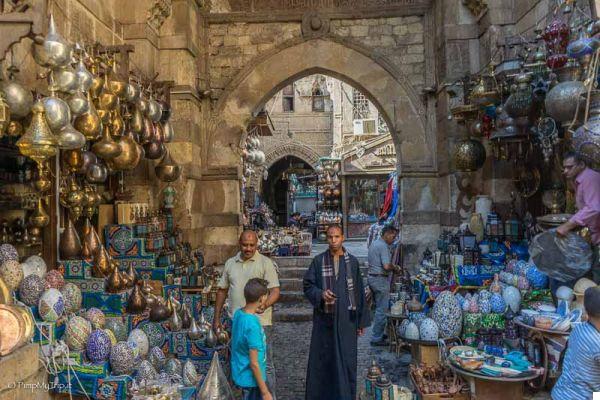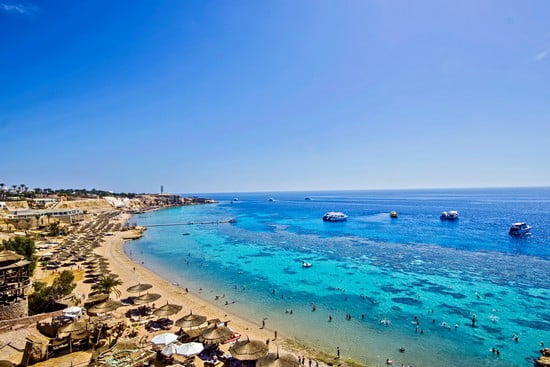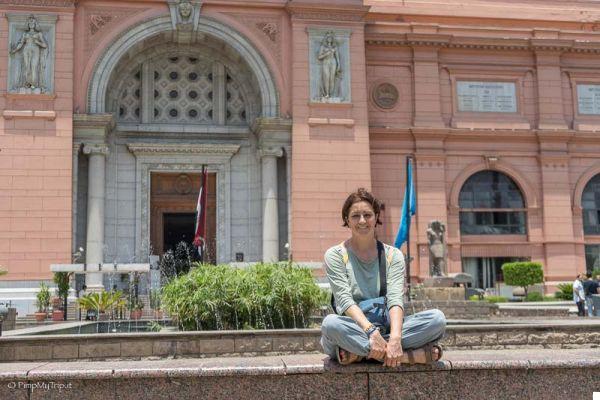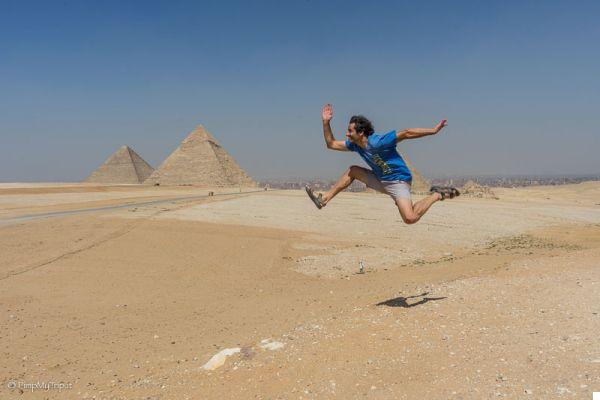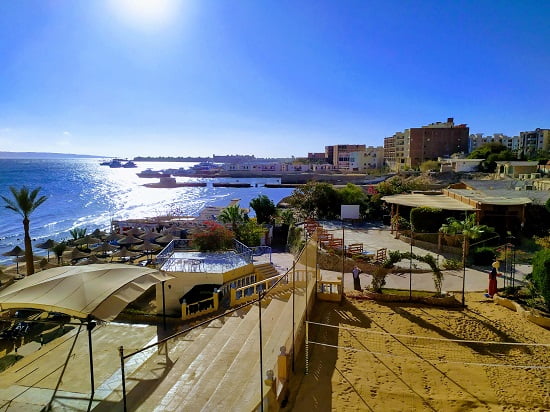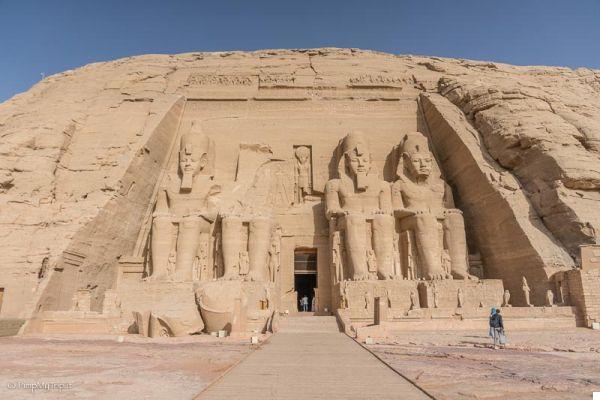Un trip to Egypt it's one of the must-do things in life sooner or later. I swear to you, you will not regret if you decide to leave: in Egypt there are some of the most beautiful places I have ever seen in my life.
But is Egypt safe? As you can travel to Egypt safely? In this post I try to answer your questions!
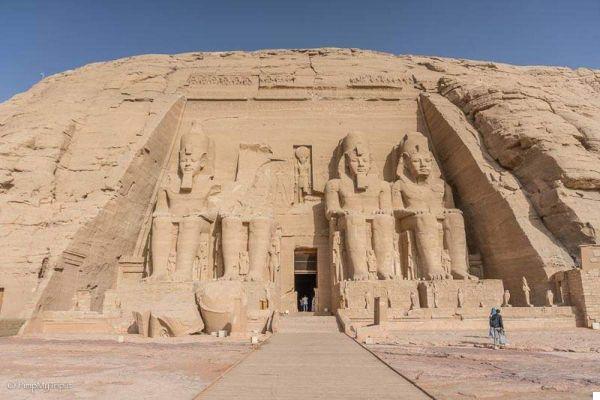
Lately there is a lot of talk about how to travel to Egypt safely and I've heard to let it go right now. Honestly, COVID permitting, I hope instead to be able to return again and again: I have been to Egypt a lot of times and I have learned that it is a country that has a far worse reputation than it actually is.
That said, if you are considering traveling to Egypt, it is a smart thing that you are doing the proper research to find out if you should go or not.
So I decided to try to give you some advice to leave and travel safely, hoping it will help you do it more calmly! Read on below to find out what Egypt really is and to answer the question “Egypt is safe” once and for all.
WARNING!
Always take out travel insurance. I advise you Heyworld e buying it here you have a 10% discount exclusively for Fortourslovers readers.
I have always traveled in DIY Egyptbut if you are thinking of doing it with a tour operator my advice is to look at the tours they offer THE CITY from one-day visits to entire week-long itineraries.
Civitatis is one of the agencies I collaborate with the most (read here my review on Civitatis and how it works) and I've tried tons of their tours. They rely on the best local agencies and have really competitive prices!
-> WATCH HERE without commitment THE TOURS OF CIVITATIS IN EGYPT
If you want to visit Cairo with a reliable local guide, write me and I will give you the contact details of my friend Nagy (the best guide ever in Cairo)
Egypt is one of the places that should always be at the top of many people's wish lists: it is filled with cultural jewels, it is the cradle of civilization and home to some of the most remarkable ancient wonders.
- Is Egypt Safe?
- My experience in Egypt
- 10 Tips for Safe Travel to Egypt
- 1 - Book guided tours or go with an organized trip
- 2 - Leave prepared and with the right suitcase!
- 3 - Beware of rip-offs
- 4 - Do not drink tap water and beware of ice
- 5 - Get health insurance
- 6 - Do not turn at night in uncrowded areas and pay attention to TAXI
- 7 - Watch out for pickpockets
- 8 - Always carry a First Aid kit
- 9 - Don't drive and pay attention to the road
- 10 - Pay in cash
- Final thoughts on security in Egypt
Is Egypt Safe?
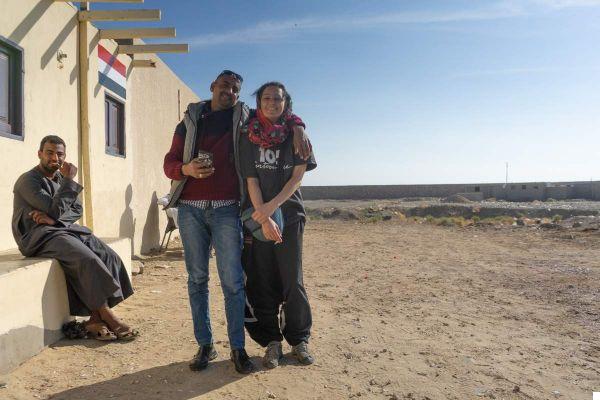
So I try to answer the million dollar question: theIs Egypt safe?
I turn it around with a question to you: why do you think Egypt is unsafe? For the COVID situation? I'm sorry but if this is what you are asking, I cannot answer you: the last time I was there (January 2020) everything 'this mess had not yet broken out.
However, I can tell you that the tour operators that organize trips to Egypt now have very strict rules for what concerns safety and guarantee social distancing as much as possible (my mom how much I hate this term, wouldn't it be better to define it "physical distancing"?), the use of masks, the sanitation of environments etc etc etc.
The Red Sea resorts do the same so, paying attention, I personally think there are no problems.
But there are other reasons why some people think you can't travel to Egypt safely and I understand that. When it comes to security, Egypt certainly doesn't have a great reputation. Politically it has had unstable periods, we all remember the riots of the "Arab Spring of 2011" first.
Therefore, one of the dangers that we can be most afraid of is the risk of terrorist attacks.
La security in Egypt varies from area to area. There are certainly areas where the Egyptian government advises against (and others where it is forbidden) for tourists to travel alone, for example the North Sinai and the area of Suez passage.
In Egypt the tourist areas such as Luxor, Aswan, Cairo or the tourist areas on the Red Sea such as Marsa Alam they are safe and heavily guarded by the armed police forces.
During the Cairo visit you will be able to see the police forces guarding the areas most frequented by tourists and potentially at risk.
Ironically, in Cairo I found it much more dangerous to cross the street without being run over than a potential terrorist attack.
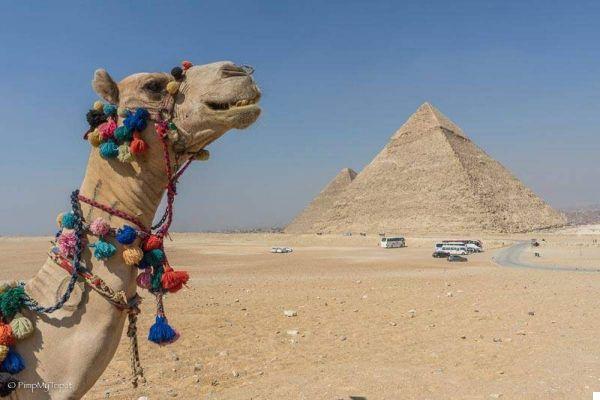
With regard to the Sinai Peninsula, every vehicle entering and leaving this region is regularly checked by the police.
Having said that, we certainly cannot forget the terrorist attacks in Dahab in 2006 and the most famous one in Sharm el-Sheikh in 2005, but we live in an era in which sadly acts of terror and violence also occur in Western cities such as the attack in Vienna or in the French Riviera areas, and people still travel to those places.
Personally I believe that the two biggest dangers that can be run in Egypt are the road accidents and pickpockets. At the first risk you put a piece of it by relying on serious and reliable agencies, at the second by paying more attention to where you go.
At the end, who has to decide is only you. Personally I am very fatalistic and I think that Shit happens sometimes and it is inevitable, but if we travel with common sense and attention, the risk of getting hurt or running into unpleasant situations can be reduced to a minimum.
One thing is certain: it is always better to take out travel insurance, but this applies to travel around the world, not just Egypt.
Not taking out insurance does not make you more traveler, cooler or more adventurous, but alone more unconscious.
Take a look at theHeymondo health insurance: buying it from here you have an EXCLUSIVE discount of 10%
My experience in Egypt
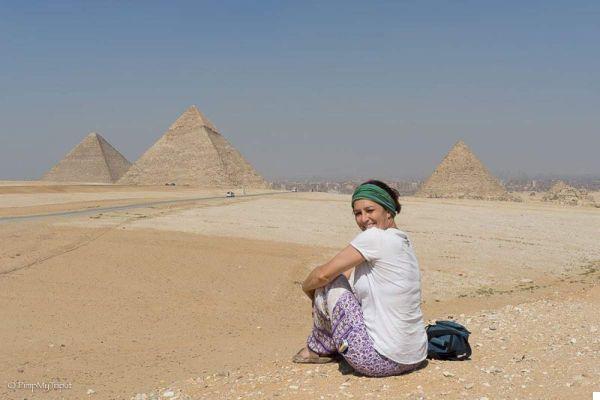
I remember that during one of my last trips to Egypt (2019) I thought about how lucky I felt to be back in a country finding very few tourists compared to the first trip I made there (2009).
I thought, at the same time and with a little sadness, as much as what was lucky for me (low prices and few people) on the contrary it was a tragedy for the Egyptian people.
Few tourists, little income, more poverty. I thought how sad it is that the locals too often and without any fault have to pay the consequences of the problems of the country in which they live.
What I say to all those who ask if they ask me if “it is safe to travel to Egypt”, I reply that personally I have not noticed anything during the trip that made me feel insecure, indeed insecure is an exaggeration.
I have met wonderful people and have never even had for a moment that thrill sensation in the back of my neck that I have experienced in other situations during my travels such as Guatemala or Brazil.
Trying to rationalize, I have gathered my thoughts below.
Egyptians are incredibly friendly and will go out of their way to make sure you have a good experience. They are passionate about their country and want visitors to see how beautiful Egypt is.
The country needs tourism. It is a symbiotic relationship: we want to see Egypt and it is in Egypt's interest to keep tourists safe. It is certainly not in their favor to allow something unpleasant to happen to tourists.
For the first reason, often the most touristic places like the Pyramids of Giza o Aswan they are chaired by a huge deployment of law enforcement.
Most of our time was spent outside Cairo. Once you are in smaller cities like Luxor and Aswan, the tiny villages on the Nile, you are completely disconnected from any chaos that happens.
Most locals would tell you that they barely noticed that a revolution was taking place because their problems are the normal ones of every person who works to make a living.
We took the public buses and often in the evening I walked in the markets with my camera, I was never bothered by anyone except to convince me to buy something.
With organized tours the feeling of a dangerous country is totally absent: their business is to make tourists stay and feel safe: they live on that.
La Nile cruise it is absolutely safe! You can read my post on what to know about the Nile cruise.
In general, however, the impression was that the government and the whole country no longer absolutely want something to happen to tourists: the checks are very brutal, they will ask you for documents almost everywhere, there are police blocks on the street to check and in some areas can only be entered with a permit and often, at the entrance of the archaeological sites, you will have to pass your luggage under the scanner.
10 Tips for Safe Travel to Egypt
Here it is, after this not even brief introduction to security in Egypt we finally arrived at 10 tips for safe travel I hope they will help you to leave more peaceful!
1 - Book guided tours or go with an organized trip
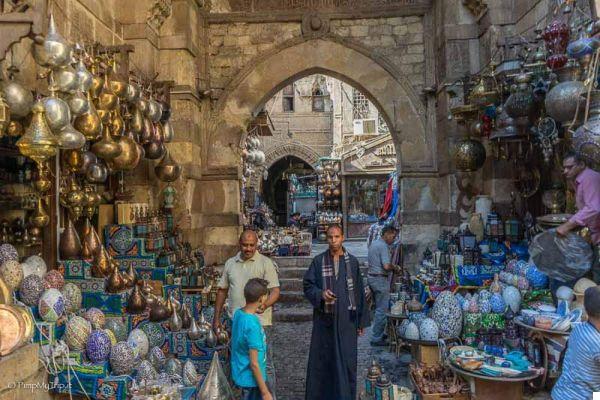
This is the first rule if you prefer to feel more protected, but not only: having everything organized you will need less time to visit the country and you will not have "downtime", you can travel on safe, fast and more comfortable vans (with air conditioning), but above all you will have a guide with you who will explain everything about the monuments you are going to visit, about the history and traditions of Egypt.
If you don't want to travel with a tour operator, another smart choice is to participate in daily tours with a guide. I have already explained in other posts why not trust the people you meet on the street and offer you visits: better ask a local agency at your hotel or book via the internet.
Especially in Cairo and at the market of Khan el Khalili a guide is very useful. People will be less insistent on pulling you into their shops if there is a guide with you, they will also be able to advise you on what to buy, help you avoid any scams and will keep you safe from pickpockets (markets are their favorite hunting ground) .
Furthermore, the market is a terrible tangle of alleys and there is the risk of getting lost and ending up in less recommendable areas.
If you want to book early I strongly recommend these tours of Cairo. I have done them all and I assure you that they are all UNMISSABLE experiences:
CLICK ON THE LINKS FOR TOUR DETAILS:
- >> FULL Cairo tour in ENGLISH (the most sold and with great reviews)
- >> Day tour CAIRO and GIZA PYRAMIDS in ENGLISH
- >> Evening tour of Cairo with dinner, visit of Khan el Khalili and drink from El Sharawi (historic venue. This tour also takes place in ENGLISH)
- >> Sound and Light Show at the Pyramids of Giza with hotel pick-up and dinner
- >> Evening Nile Cruise with Show and Dinner (UNMISSABLE)
There are also so many tour con Getyourguide, but personally those of Civitatis in my opinion they are better because many with guide in ENGLISH.
- >> CLICK HERE to see the Cairo tours on GETYOURGUIDE anyway
Needless to tell you that visit the pyramids without a guide it's the biggest mistake you can make: you don't want to miss out on all the fascinating stories it has to tell right?
Not only that, with a tour you will avoid ramshackle minibuses, wasting a lot of time in unlikely trips and traveling more comfortably and safely.
Below you will find some of the best day tours from Cairo with official guide:
- >> Tour Pyramids of Giza, Memphis and Sakkara in ENGLISH (a must)
- >> Alexandria tour in ENGLISH (another must)
->> Tour all'oasi del Fayyum. The agencies offer it, I have been there but with a private guide and in 2 days sleeping in the desert in a tent, cool, I also sciato on the dunes. Honestly, however, given the distances, in one day I would NOT recommend it and in fact the reviews are not enthusiastic, but if you are curious you could try and let me know how it went)
2 - Leave prepared and with the right suitcase!
It seems trivial, but even the things you bring with you can help you travel more safely: caution is never too much, my grandmother told me.
From anti-theft backpacks to belts for money, credit cards and documents, there are lots of items you should evaluate, especially if you travel alone and on public transport or if you decide to sleep in shared hostels.
Most of them are things I use personally, they are small, light and will give you little bother, so why not?
First of all bring a padlock with which to close your suitcase, especially if it is rigid: something like these specially for backpacks and suitcases could be for you, or how this padlock which however costs more. Many hinges can be opened easily with sharp objects such as a writing pen.
If you travel to a hostel, the padlock is also essential to close the cabinet or the locker with all your precious things inside and go around peacefully.
Second, the majority of travel backpacks are not very safe: you could fall asleep peacefully on the night bus to find in the morning that your backpack has been stolen or that someone has made a cut on your side slipping his hand into it.
Unless it's a cut-proof backpack, the material can be cut or torn by anyone determined enough.
This is my cut-proof 40-liter carry-on bag and I always use it, so the thieves with the knife are screwed, tiè!
For the day backpack instead I have THIS anti-cut backpack and with the safety on the hinges for daytime cruising. I assure you it's crazy cool.
This photo below is the proof tested that I have them personally (photo from my Instagram profile)!
Always be aware of your valuables (like the computer or the camera) and try to keep an eye on them in such a way that it becomes, if not impossible, at least difficult to have it stolen: this in 99% of cases will discourage any malicious person.
I typically use my large backpack as a pillow on train / bus routes and sometimes tie it to a seat using a steel bicycle cable, but this cable that I found on Amazon especially for backpacks it's better.
It was very helpful to me on the night train between Cairo and Aswan, it is light and takes up very little space, impossible to leave without!
If, on the other hand, you want to do serious things, you could even take the steel mesh for the backpack.
For the PC for example on a beach or in some public smart working place you could look this bag here made on purpose: you can easily tie your computer to something solid and it will be impossible for them to take it away from you.
However, I advise you to look at all PACSAFE products on Amazon because there are some crazy cool things.
Always use a belt to hide money like this one here (especially for documents and credit cards) when you travel!
At this link on Amazon you will find many, of all shapes and for all tastes.
Losing money is indeed a big hassle, but lose your passport I assure you that it is even more so.
Leave your ID at the hotel in Egypt not a good choice: they may ask you for documents to enter somewhere of interest or for a check on the street. You don't want to take the risk of having it stolen, do you? Then what do you go home with?
Always do one anyway photocopy of documents to take with you that you never know, you may need them.
Last recommendation: do you really need to go around the markets with your earrings or necklace in gold and diamonds or your sparkling wristwatch?
3 - Beware of rip-offs
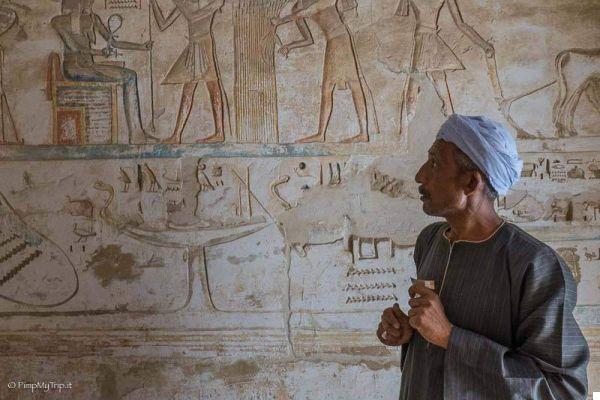
Another of the things to pay special attention to in Egypt are the rip-offs. I would not speak of "scams" but still they are always ways to get money from you in a not-too-honest way.
These are some of the most common scams, knowing them will help you recognize and avoid them:
Security guards - All archaeological sites have guards at the entrances or around to check. Their real responsibility is to enforce the rules of not photographing and protecting the ruins, but often their "secondary mission" is:
1 - take pictures of tourists in front of that hieroglyph or inside the tombs where it is forbidden
2 - take tourists on the sly in private areas or as a guide
3 - pretend to have seen you photograph
Obviously all this is aimed at getting coins later. Never accept and follow the rules of the archaeological site or the place where you are!
Ticket Checker Scam - apparently this is a scam that happens quite often, especially at the Pyramids of Giza. Some crooks, dressed as controllers, will ask you to show your ticket, tell you it's the wrong one, and try to hand you a (fake) fine. do not show the ticket: generally in Egypt the check is done at the entrance and not among the archaeological ruins.
Souvenir shops and sellers - shops or vendors are usually the biggest problem or hassle in Egypt: they can become really annoying and suffocating, driving you to exasperation just to sell you something. They are tough as never before and they come up with a new one every second. In general, never believe when they tell you “everything in here for $ 1 (ploy to get you into the store). Never believe whoever wants to give you something. This bracelet is free, it is a gift, you have it tied on your wrist and you are screwed because then they will insist on having money, sometimes even going so far as to follow you or confront you with a threatening way until you give them what they ask for just to get them out of your way. Or they'll tell you to accept a gift but expect you to give them one, i.e. buy something (at an inflated price)
There are other scams and scams you might run into, but if you learn to recognize them you are more or less safe.
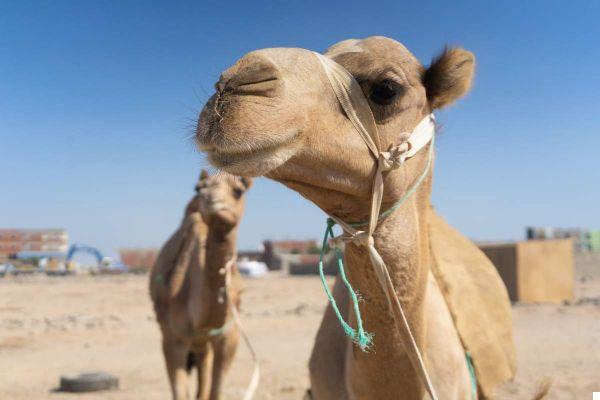
In general:
- Never give to anyone your phone in hand for whatever reason you ask.
- Never trust of those you meet on the street whether you stop to take you somewhere, or to change money.
- Get an official guide, many of them will not even approach for fear of being reported or scolded by the guide.
- When you buy anything make it clear. For example, if you decide to get on the camel to take a photo, agree on the price for both getting on and off the camel. If you decide to take a horse-drawn carriage ride, agree on the price, the duration and the itinerary before getting on
- The most important rule of all: learn to say no gently but firmly. If you start screaming, they will scream louder than you.
Last thing: no one has ever died for a scam. It can be annoying to be screwed, but in the end you come home safe and sound. Each country is different and each has a different way of doing business depending on their culture.
As a traveler you learn to understand it, respect it and deal with it. After all, you are in their country and those behaviors and customs they are part of the game.
4 - Do not drink tap water and beware of ice
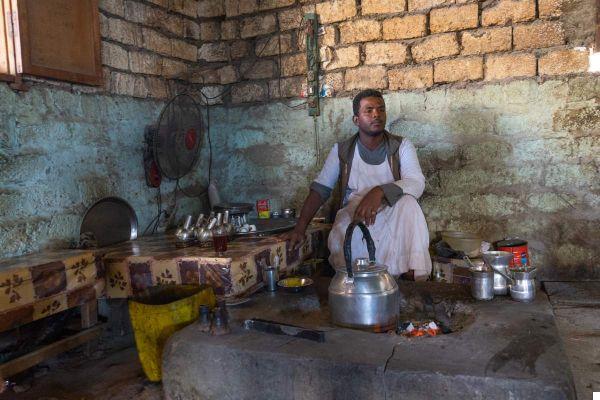
Almost 100% of the tourists who visit Egypt are attacked by what is called the Tutankhamun's curse.
In fact it is a beautiful one gastroenteritis which affects with vomiting, diarrhea and high fever. It typically only lasts for a couple of days and then some kind of immunity develops that will let you enjoy your vacation to the end.
While taking precautions is sometimes not enough, there are some things that could help you avoid it and among them is that to take lactic ferments before leaving or during the trip.
While it's really hard to avoid taking the curse, one thing is sure: tap water should be avoided like the black plague.
Don't drink tap water in Egypt and above all do not use it even to brush your teeth: always use the bottle (before buying it, make sure it is sealed with plastic wrap).
Conversely, boiled water for tea or coffee should be OK.
Water is very cheap in Egypt and around markets or places of interest you will have no problem finding someone to sell you a bottle. You can find it easily for around 20 cents. Make sure you have some change with you and in the correct amount.
Many times sellers do not accept large bills or euros when it comes to low-cost items also due to the difficulty of giving you change.
Also be careful when, especially in summer, you will be craving a nice iced juice: the ice is made with tap water! Ask for everything without ice, even in drinks on Nile cruise ships.
In case you get sick, there are some medicines you need to have with you in your first aid kit, you can find them by reading further on.
5 - Get health insurance
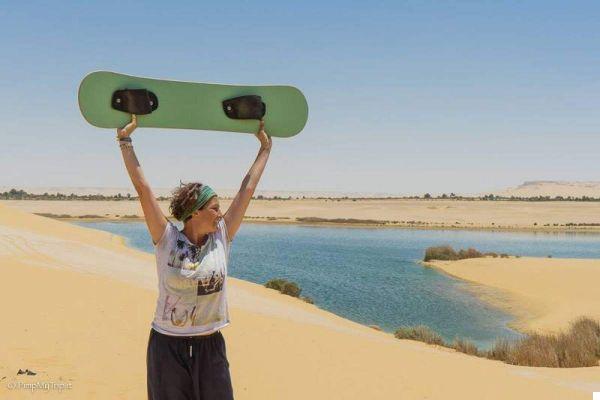
By now I'm almost tired of writing it in my articles: do health insurance.
Doing insurance is an awareness as well as responsibility. You never know what can happen.
For example, I would never have thought of opening my foot with a glass in Senegal on the beach (thank goodness I had sandals otherwise it was a mess) or to stretch a tendon as happened to my friend Margherita during our trip to Kyrgyzstan.
Being a more experienced traveler doesn't protect you from accidents: You may feel sick, sprained an ankle, cut yourself and need to go to the hospital.
When you buy travel insurance, you not only buy the fact of receiving the best care if needed, but you also and above all buy the tranquility of yours and those who are at home waiting for you.
Thought of Martina: as far as I'm concerned it's also a question of karma: the time I don't do it, maybe the only time in my life that I don't do it, is likely to be the time I need it later.
They also don't cost much anymore, you don't have to pass out: in most cases you can buy full coverage for less than 100 euros, take a look at theCivitatis insurance at this link which also offers full coverage for COVID-19.
6 - Do not turn at night in uncrowded areas and pay attention to TAXI
This is another of the tips I give in all the blog articles where I talk about safety: do not wander alone in areas not recommended at night.
Generally they are also peripheral and less frequented areas, far from the most touristic places and therefore the question I would ask myself is: what am I going to do there?
But let's say you misplaced the location of your hotel. Sometimes it happened to me too. Or maybe you have chosen a more peripheral accommodation to save some money. This also happened to me.
The first rule in Egypt if you happen to be in this situation is to go out and get around by taxi and have them call you from your hotel. Do not stop them on the street, sometimes they are real criminals, not official taxis and could take you to desolate areas to then ask you for a ransom to take you home.
If you still decide you want to take the risk, at least stop one official taxi.
Same thing when you leave the restaurant in the evening to go back to the hotel: have the restaurant call you.
One of the things I learned when I was living abroad and that in Egypt it is absolutely recommended to do is to NEVER pay for a taxi in advance.
If you happen to be with an attacker, he could then not take you to your destination (he has already taken the money) and abandon you somewhere, perhaps in the middle of the countryside or ask you for more money to bring you home.
Another good practice is to ask the hotel for the cost of the ride and put the right amount in your pocket. This will save you from pulling out the swag of bills and if anyone saw it he might be tempted to take it.
Put the swag in a safe place, in the hidden money belt. When the taxi driver asks you for money, he takes the right amount out of his pocket and if he asks you for more, he turns his pockets around to show him that you have no more.
Maybe sooner or later even the delinquents will notice this trick, but for me in general so far it has always worked well.
In general, however, another good rule is that of always ask the hotel or your guide about the safety of a seat before going there. Things can change quickly and no one better than local people can give you accurate information.
7 - Watch out for pickpockets
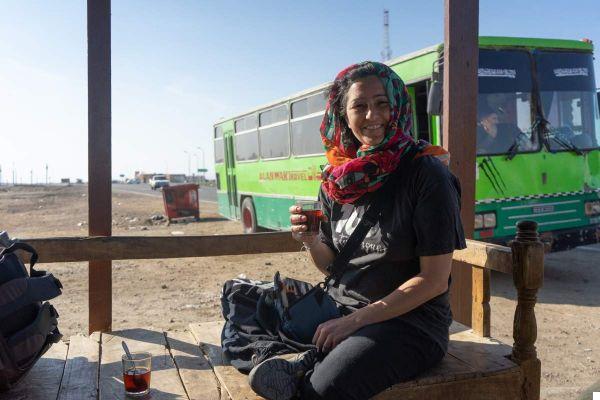
If so many scams or dangers are found in less frequented and more secluded areas, this is not the case for the pickpockets.
They are indeed very shrewd and their favorite hunting grounds are crowded places full of tourists. Markets, for example, are among the places where this happens most often: there are many people but above all many tourists and few in the crowd pay attention if they feel a contact.
Pay attention to whoever stands in front of you, obstructing the passage: it is easy that taking advantage of this, his colleague from behind you will take your wallet out of the back pocket of your pants (aaaahhhh men who sometimes have 'I'm vice of the wallet in the back pocket of jeans).
Put it on backpack on the front in order to have it clearly visible and avoid things in the pockets.
On the contrary the archaeological sites are not very dangerous. There is a ticket to enter and they are gated areas and with security personnel. Most of the people who visit them are tourists and souvenir sellers, so you can rest easy.
8 - Always carry a First Aid kit
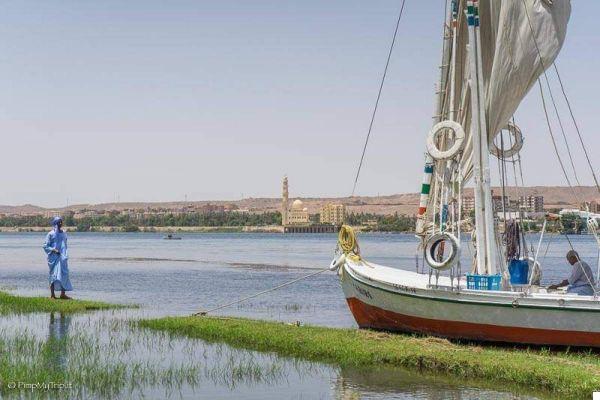
Il first aid kitor is it one of the things you should always take with you when you want to travel safely.
There are a thousand travel types and they are generally light and compact, so they can be safely carried even in the day backpack.
When you buy it you can also put other things in it.
Generally in the kit they should never be missing:
- Scissors and tweezers
- Disinfectant
- Sterile gauze
- Patches
- Cortisone cream
- Muno-use gloves
- Cream for sunburn
- Thermometer
- Antipyretic (fever)
- Antidiarrheal
- Antiemetic (nausea and vomiting)
- Intestinal disinfectant
- Broad spectrum antibiotic
Of course, you can then customize it more or less depending on the country you are visiting, but the things listed above are what you should have on a trip to Egypt.
9 - Don't drive and pay attention to the road
This is not the kind of country where you can simply take a car and go about your own business. I mean, you can do it, but it doesn't suit you.
Traffic and driving style are just plain scary, which is why having your own guide and driver is the way to go.
Cairo as traffic is hell on earth, I think it's the worst place I've ever seen in the world.
This is one of the reasons why you have to be very careful even when crossing the road: there is always some scooter that pops up at an impossible speed without you expecting it among the cars wedged in the queue.
If you really find yourself in a situation where you can't help but cross, a good trick is to get on the heels of some place that goes through them too: they are much more used to it than we are and know when to do it and when not.
Never trust that someone with the car will let you pass, you could wait until you mummify and always check, even with the green light for pedestrians, that the cars are stopped before throwing yourself into the road.
10 - Pay in cash
Pay cash it is always a good practice in Egypt. You will avoid having your credit card cloned or, worse, having it stolen.
In Egypt I have never had problems with withdrawing from ATMs, in generally tourist areas there are plenty of them even if not all accept international circuits. However, withdrawing cash is something that can be done without too much hassle and if you have a guide it will surely take you to the right place.
Avoid exchanging money on the black market: they are very convenient as an exchange, but you also risk getting yourself some good rip off, especially if you still have to practice with the local currency.
If you really want to pay by card then you better opt for one Debit Card thus, in the event of theft, cash is limited. But be careful because sometimes it's not accepted.
Try to have small coins and local currency: some may not have the change and in the end you will have to leave it to them.
Final thoughts on security in Egypt
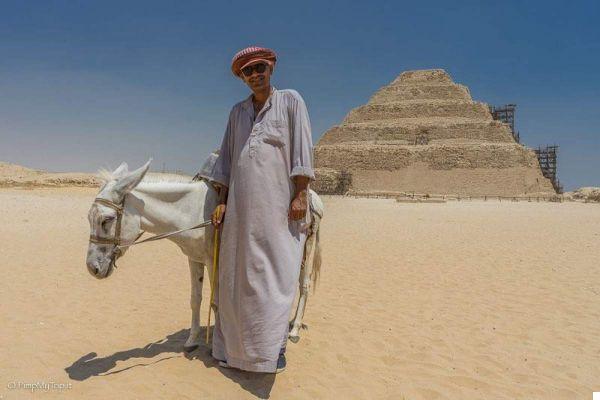
Let's go back to the original question: "Is Egypt safe for travel?".
My opinion? Yes it is, but if you have any doubts the best thing for you is to go with a local travel agency, travel in a group (family, partner or friends) and book private tours even daily.
Thinking about everything I have seen in Egypt and its wonders, I would like to tell you that fear must absolutely not be a stake to go there.
Ultimately though, you can't travel to Egypt expecting it to be like Japan, Singapore, or New Zealand.
Hopefully this guide was helpful, but if you have gods too advice to be given on security in Egypt write them to me in the comments.
Now that you know what to expect, you are sure to have a great time in Egypt. It is truly a special place and will be one of the best trips you have ever been on.




